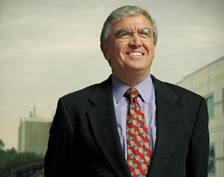Former Dean Nicolaos G. Alexopoulos
 Nicolaos G. Alexopoulos joined the UC Irvine faculty in 1997 as engineering dean and professor in the Department of Electrical Engineering and Computer Science. Under his leadership, 61 faculty members joined the school, totaling 105, and student enrollment grew from 1,160 undergraduate and 340 graduate students in 1997-98, to 2,215 undergraduate and 893 graduate students in 2007-08. Overall research expenditures also increased from $7.7 million during 1997-98 to $21.9 million in 2006-07. The Samueli School added 14 endowed chairs, 10 members of the National Academies, and rose in the U.S.News and World Report Best Graduate Schools rankings from 49th in 1997-98 to 37th in 2007-08.
Nicolaos G. Alexopoulos joined the UC Irvine faculty in 1997 as engineering dean and professor in the Department of Electrical Engineering and Computer Science. Under his leadership, 61 faculty members joined the school, totaling 105, and student enrollment grew from 1,160 undergraduate and 340 graduate students in 1997-98, to 2,215 undergraduate and 893 graduate students in 2007-08. Overall research expenditures also increased from $7.7 million during 1997-98 to $21.9 million in 2006-07. The Samueli School added 14 endowed chairs, 10 members of the National Academies, and rose in the U.S.News and World Report Best Graduate Schools rankings from 49th in 1997-98 to 37th in 2007-08.
From 1969-96, Alexopoulos served on the faculty of the Department of Electrical Engineering at UCLA, assuming the roles of associate dean of faculty affairs and chair of the department during his tenure. He is the author of more than 270 professional journal and conference papers, has served on the editorial boards of several professional journals and has been editor-in-chief of Electromagnetics. In 1985, he was elected Fellow of the Institute of Electrical and Electronics Engineers (IEEE), and he has received the IEEE Schelkunoff Best Journal Publication Award twice (1985 and 1998). Ten of his journal publications have been published in volumes of the most significant contributions in the field. He was named the “Engineer of the Year” in 2000 by the Orange County Section of IEEE and received the Engineering Educator Award by the Orange County Engineering Council in 2001.
In 2002, the American-Hellenic Council honored Alexopoulos for his distinguished service and contributions to Hellenism and the American-Hellenic community. He also received an honorary doctorate from the National Technical University of Athens for contributions to education and research in engineering electrodynamics and for his public lectures on the “Genesis and Destruction of the First Research University: The Museum/Library of Alexandria,” in 2005.
Alexopoulos is a member of the New York Academy of Sciences and an ISI Highly Cited Author in computer science. He received the 2006 Orange County Engineering Council Award for Outstanding Contributions to Engineering Education in Orange County, and was elected to the National Academy of Engineering in 2007 for “contributions to microwave circuits, antennas, and structures for low observable technologies, and for contributions in engineering education.” He Alexopoulos was also honored with the Forum for Corporate Directors Chairman’s Award at the 13th Annual Director of the Year awards event, and the AeA Engineering the Future Lifetime Achievement Award at the 2008 15th Annual High-Tech Innovation Awards Dinner.
Together with engineering faculty and colleagues, Alexopoulos supported the creation of numerous school and campus advancements, including the establishment of the National Fuel Cell Research Center in 1997, the Integrated Nanosystems Research Facility in 1998, establishing the first “named” school on the UCI campus in 1999, and the Center for Pervasive Communications and Computing in 2000. He also initiated and supported the establishment of UCI's California Institute for Telecommunications and Information Technology (Calit2) in 2000, as well as the development and launch of a new Biomedical Engineering Department in 2002. In 2006, he led the creation of a Center for Engineering Science in Design, as well as celebrated a new program called “LifeChips.” In 2007, The Edwards Lifesciences Center for Advanced Cardiovascular Technology was established with a $5 million gift from Edwards Lifesciences Corporation.
Alexopoulos is the former principal investigator of the California Alliance for Minority Participation (CAMP) program, which encourages minority participation in science, mathematics, engineering and technology. He was also the principal investigator for the UCI Mathematics, Engineering, Science Achievement (MESA) program, an academic outreach and enrichment program that supports educationally disadvantaged students in elementary, middle and high schools so they can excel in math and science studies, and graduate with baccalaureate degrees in math and science-based fields.
Born in Athens, Greece, he graduated from the Eighth Gymnasium of Athens in 1959 and received his B.S., M.S., and Ph.D. from the University of Michigan at Ann Arbor in 1965, 1967 and 1968.
